2023-2024学年九年级英语教学同步精美课件(人教版)Unit1 核心词汇与单元知识点精讲
文档属性
| 名称 | 2023-2024学年九年级英语教学同步精美课件(人教版)Unit1 核心词汇与单元知识点精讲 |  | |
| 格式 | zip | ||
| 文件大小 | 3.5MB | ||
| 资源类型 | 试卷 | ||
| 版本资源 | 人教新目标(Go for it)版 | ||
| 科目 | 英语 | ||
| 更新时间 | 2023-08-10 10:10:36 | ||
图片预览

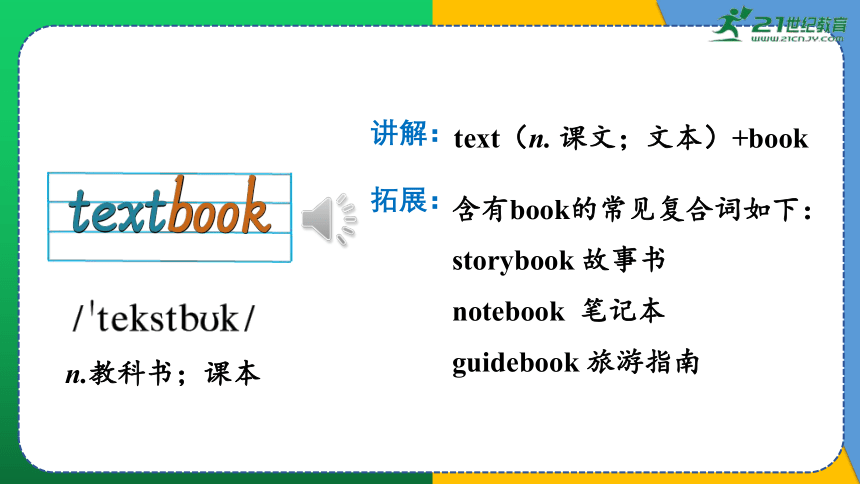

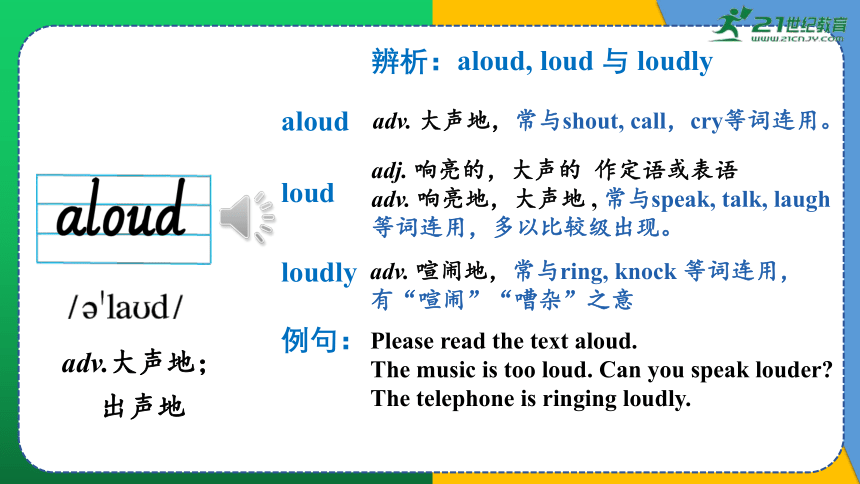
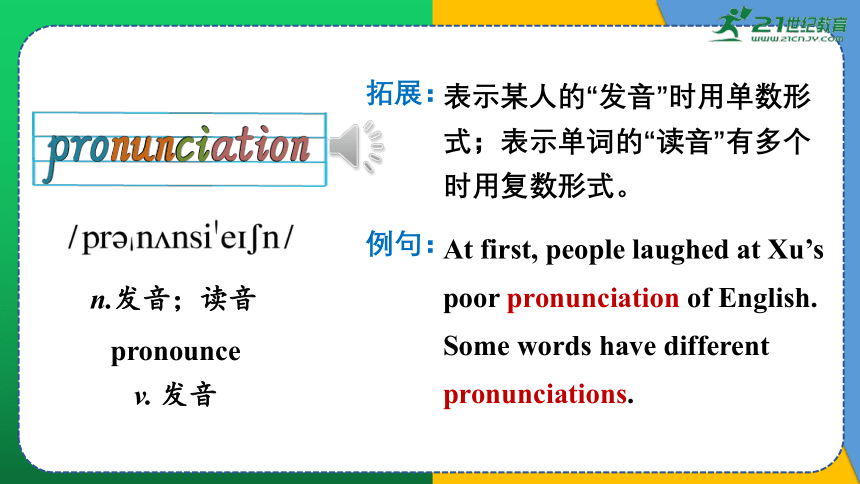
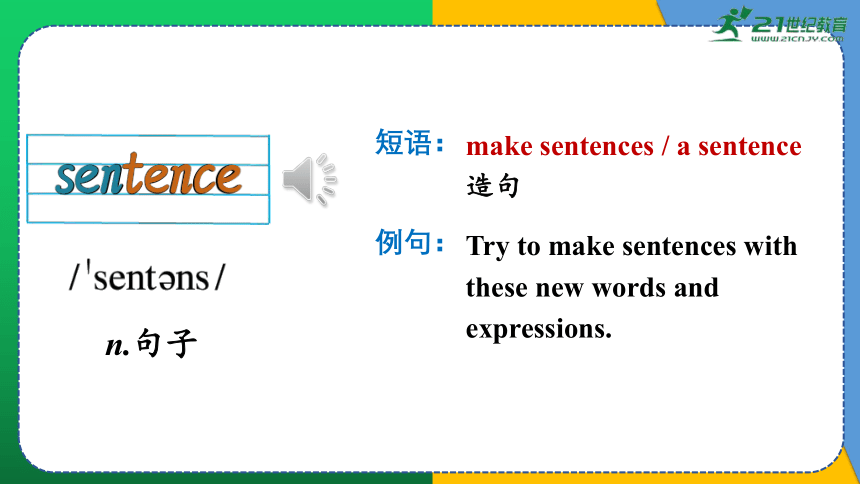
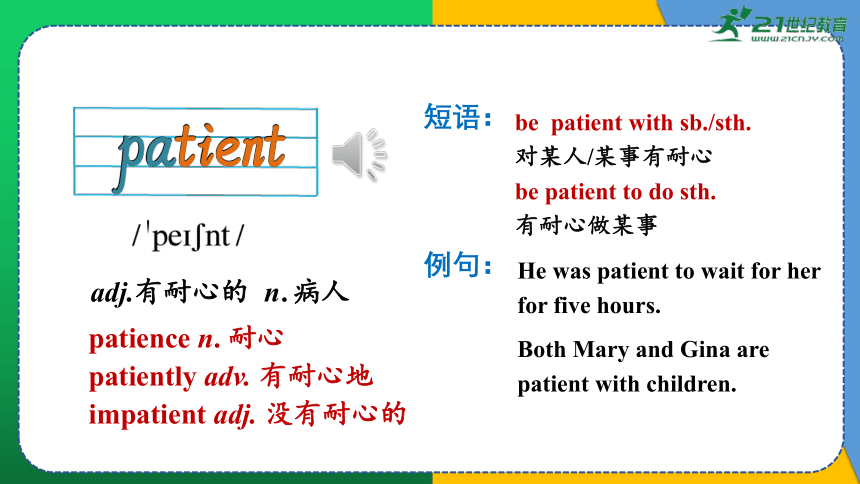
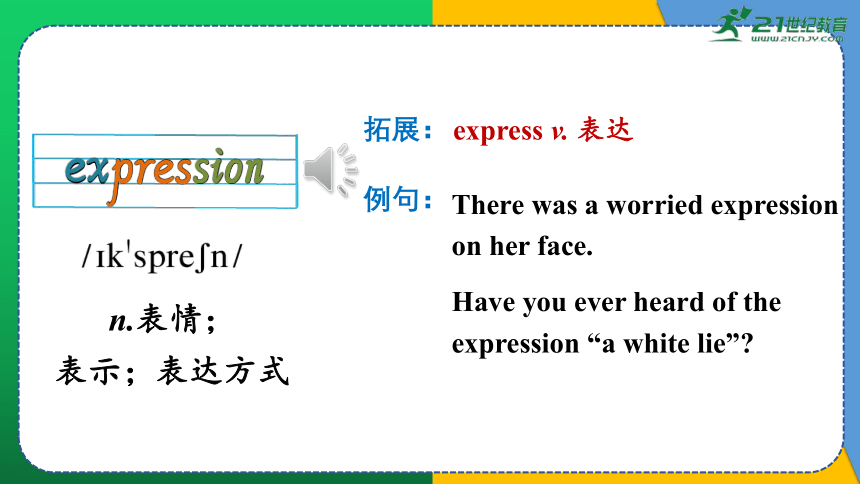
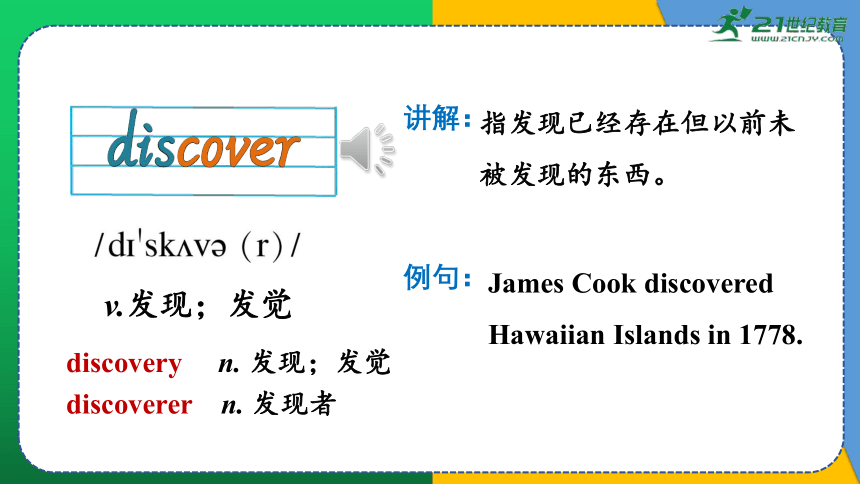
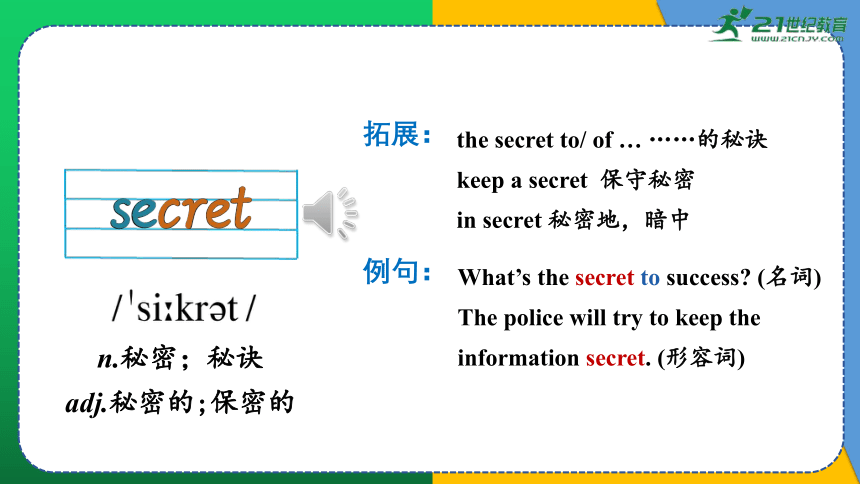
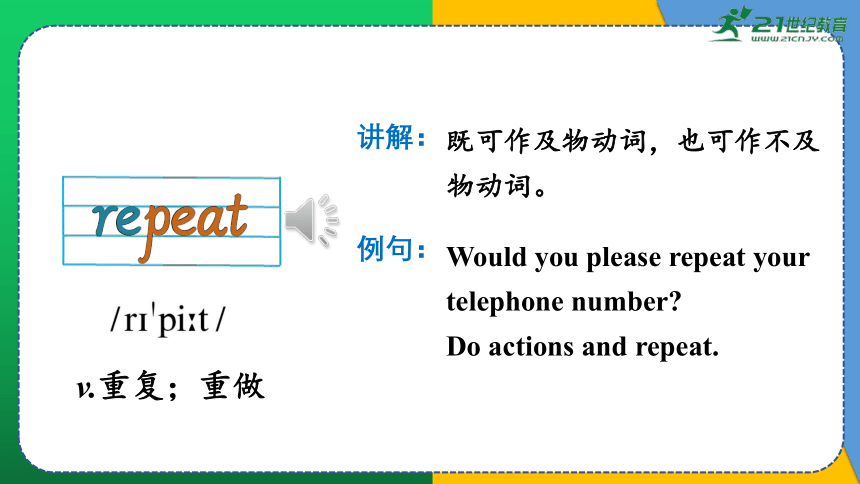
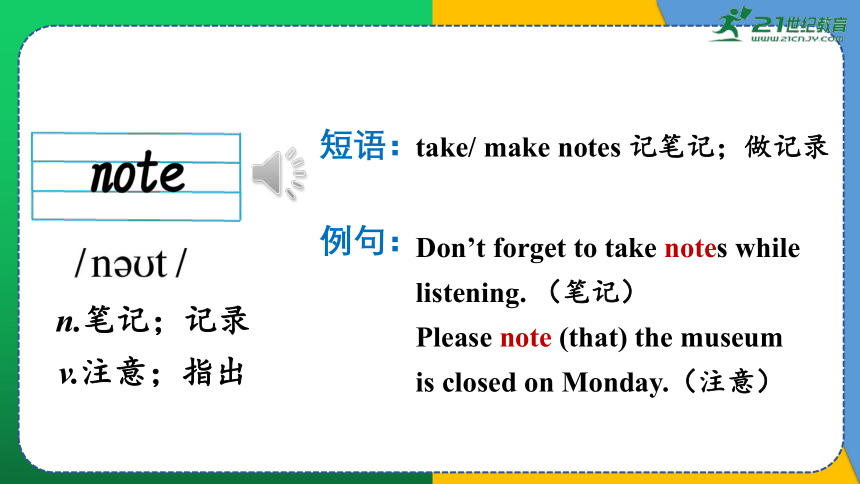
文档简介
(共109张PPT)
Unit 1
How can we become good learners
核心词汇讲解&
单元知识点讲解
人教版新目标 九年级
含有book的常见复合词如下:
拓展:
storybook 故事书
notebook 笔记本
guidebook 旅游指南
text(n. 课文;文本)+book
讲解:
n.教科书;课本
短语
have conversations with sb.
与某人交谈
=have a talk with sb.
或talk to/with sb.
可数名词:指某次具体的谈话
不可数名词:泛指谈话
Shy people find conversation difficult.
例句
Who had conversations with your classmates
辨析
例句
n.交谈;谈话
adv. 大声地,常与shout, call,cry等词连用。
aloud
辨析:aloud, loud 与 loudly
adj. 响亮的,大声的 作定语或表语
adv. 响亮地,大声地 , 常与speak, talk, laugh等词连用,多以比较级出现。
loud
adv. 喧闹地,常与ring, knock 等词连用,有“喧闹”“嘈杂”之意
loudly
Please read the text aloud.
The music is too loud. Can you speak louder
The telephone is ringing loudly.
例句:
adv.大声地;
出声地
拓展:
pronounce
v. 发音
At first, people laughed at Xu’s poor pronunciation of English.
Some words have different pronunciations.
例句:
表示某人的“发音”时用单数形式;表示单词的“读音”有多个时用复数形式。
n.发音;读音
Try to make sentences with
these new words and expressions.
例句:
短语:
make sentences / a sentence
造句
n.句子
He was patient to wait for her
for five hours.
例句:
Both Mary and Gina are patient with children.
短语:
be patient with sb./sth.
对某人/某事有耐心
be patient to do sth.
有耐心做某事
patience n. 耐心
patiently adv. 有耐心地
impatient adj. 没有耐心的
adj.有耐心的 n.病人
There was a worried expression on her face.
例句:
Have you ever heard of the expression “a white lie”
express v. 表达
拓展:
n.表情;
表示;表达方式
James Cook discovered Hawaiian Islands in 1778.
例句:
讲解:
discovery n. 发现;发觉
discoverer n. 发现者
指发现已经存在但以前未被发现的东西。
v.发现;发觉
拓展:
the secret to/ of … ……的秘诀
keep a secret 保守秘密
in secret 秘密地,暗中
What’s the secret to success (名词)
The police will try to keep the information secret. (形容词)
例句:
n.秘密;秘诀
adj.秘密的;保密的
讲解:
既可作及物动词,也可作不及物动词。
Would you please repeat your telephone number
Do actions and repeat.
例句:
v.重复;重做
短语:
take/ make notes 记笔记;做记录
Don’t forget to take notes while listening. (笔记)
Please note (that) the museum is closed on Monday.(注意)
例句:
n.笔记;记录
v.注意;指出
拓展:
physical adj. 物理学的
chemical adj. 化学的
physicist n. 物理学家
chemist n. 化学家
He has taught us physics since he came to our school.
The lady in a red dress is our chemistry teacher.
例句:
n.物理;物理学
n.化学
拓展:
memory n. 记忆力;回忆
例句:
Watching English movies can help us memorize the pronunciation of some words.
Tom has a good memory.
The trip to Beijing gave me lots of good memories.
v. 记忆;记住
例句:
Very few people can pronounce my name right.
He pronounces very well.
即可作及物动词,也可作不及物动词。
讲解:
v.发音
拓展:
increase to+具体数字
增加到……
increase by+百分比或倍数 增加了……
Eating too much salt increases the risk of high blood pressure.
Our book sales have increased to three million in pared with ten years ago, they have increased by five times.
例句:
vt &vi.增加;增长
at a/ the speed of …
以……的速度
at high/ low/ full speed
以高/低/全速
拓展:
例句:
Safety is more important than speed.
Please drive at a speed of 60 miles an hour.
n.速度
be born 出生
be born with 天生具有
拓展:
例句:
Qian Xuesen was born in Shanghai on December 11th, 1911.
Michael Jordan is born with a gift for basketball.
He is a born actor.
v.出生
adj.天生的
拓展:
the ability to do sth.
做某事的能力
Joe showed the ability to face danger without fear.
例句:
n.能力;才能
create, discover 与invent:
辨析:
create 创造抽象的精神上的东西或新的具体事物。
discover 发现原已存在但以前未被发现的东西。
invent 创造出原来不存在的东西,尤指科技发明。
例句:
Wu Cheng’en created many famous characters in Journey to the West.
Columbus is the first European who discovered America.
The telephone was invented in 1876.
creation n. 创造;作品
creative adj. 有创造力的
creator n. 创造者
v.创造;创建
短语:
take an active part in 积极参加
Mr. Smith always encourages his students to be active in class.
I advise you to take an active part in sports and social activities.
例句:
actively adv. 积极地;活跃地
activity n. 活动
拓展:
adj.活跃的;积极的
短语:
pay attention to 注意;关注
Kids should pay attention to the eating habits.
The teacher told us to pay attention to spelling English words.
例句:
介词,后接名词、代词或动词-ing形式
n.注意;关注
短语:
connect… with…
把……和……连接或联系起来
connect… to …
使连接;接通
It is science and technology that connect progress with the future of human.
例句:
connection n. 连接;联系
拓展:
v. (使)连接;与……有联系
短语:
a review of … 对……的回顾
I spent a long time reviewing the lessons last night.(v.复习)
The teacher asked us to write a review of the year. (n.回顾)
You should read some reviews about the book before writing. (n.评论)
例句:
前缀re-(又;再)+view(v. 仔细察看)
讲解:
v. 回顾;复习
n.回顾;复习;评论
短语:
knowledge of/ about…
……方面的知识
Knowledge is power.
Marie Curie has a wide knowledge of chemistry.
例句:
n.知识;学问
拓展:
wise adj.充满智慧的;明智的
wisdom n.智慧;才智
You should think twice and choose wisely.
例句:
adv.明智地;聪明地
1. I study by working with a group.
我通过小组活动来学习。
by prep. 通过……方式(方法) ,借助……手段, 表示方式或手段
e.g. My brother studies history by working with a group.
我哥哥通过小组合作学习历史。
She made a living by selling books.
她过去以卖书为生。
by 表示位置, 在……旁边,从……旁边(经过)
e.g. Come and sit by us.
过来坐我们旁边。
by 表示出行方式,乘……,通过……
e.g. Peter goes to work by bus every day.
Peter每天坐公交车去上班。
by 表示时间,到(某时)之前; 不迟于
e.g. Tony will come back by 10:00 pm.
Tony晚上十点前回来。
【链接】
【拓展】含by的常见短语
by means of 借助于
by way of 用……方式;途经
by the way 顺便一提
one by one 一个接一个
by oneself 独自地
take ... by surprise 使……吃惊
learn ... by heart 记住
by 表示“通过……方式、手段”等
in 用某种材料(如墨水、铅笔等)或用某种语言或者表示衣着、声调、特点等
with 使用工具、方法或人体部位等
by, in & with
【图解助记】
【语境应用】
Ⅰ. 用by, with, in完成句子。
1) You can improve your English _____ reading more.
2) I wrote it down ______ a pencil.
3) He always talks to me ______ English.
by
with
in
Ⅱ. 根据提示,用含有by的短语完成句子。
1) Annie went to Beijing ________ (乘火车) yesterday.
2) His grandfather made a living ______________ (靠卖水果)
in the past.
3) The scientists have to arrive at the village _____________
(八月以前).
4) Allen goes _______________ (经过邮局) on his way to school
every morning.
by train
by selling fruits
by August
by the post office
2. What about reading aloud to practice pronunciation
大声朗读来练习发音怎么样?
What about / How about… 用于征求意见或提出建议
e.g. What about a cup of tea
喝杯茶怎么样?
How about you
那你呢?
What / How about going to the zoo this afternoon
今天下午去动物园怎么样?
aloud, loud & loudly
aloud adv. 出声地; 大声地,侧重于“让人听得见”这一含义,并不一定指声音很大, 不用于比较级
loud adv.大声地; 喧闹地,常指说话声和笑声,常与talk / speak / laugh / sing等词连用, 可用于比较级
loudly adv. 高声地; 喧闹地,可以和loud互换,含有“吵闹”的意味,不悦耳
e.g. Don’t read aloud in the library.
不要在图书馆大声朗读。
We can’t hear you. Please speak louder.
我们听不到你的声音, 请再大声点。
Don’t talk loudly in public.
不要在公共场合大声交谈。
【拓展】常用来提出建议的句型
【语境应用】选用loud, loudly或aloud填空。
1) The teacher asked Tom to read the text __________.
2) The bell on the wall _________ rang and everyone stopped his ears.
3) Could you speak a little _______, please
aloud
loudly
louder
3. It’s too hard to understand spoken English.
听懂英语口语太难了。
it是形式主语, 不定式短语to understand spoken English是真正的主语。该句句型为:
It’s + adj. + (for sb.) + to do sth.
(对某人来说)做某事是……的
e.g. It’s too easy for her to answer the question.
对她来说回答这个问题太容易了。
【链接】
too ... to ...结构常表示“太……以致于不能……”, too后接形容词或副词, to后接动词原形。
e.g. The room is too dirty to live in.
这个房间太脏了不能住。
He walks too slowly to get there on time.
他走得太慢了而不能及时到那儿。
【语境应用】将下面的句子翻译成英语。
1) 对他来说找一份工作很难。
_____________________________________________
2) 经常和父母交流太有必要了。
_____________________________________________
It’s hard / difficult for him to find a job.
It’s too necessary to communicate with parents often.
4. Don’t read word by word, read word groups.
不要逐字读,要按意群来读。
word by word 逐字地,by表示某事渐渐发生。
类似短语有: day by day 一天天地
step by step 逐步地
one by one 一个接一个地
little by little 渐渐地
e.g. She read the story word by word to her child.
她逐字给孩子读了这个故事。
Day by day he grew weaker.
他一天比一天虚弱。
【语境应用】完成英语句子,每空一词。
1) 他们逐字地讨论这个报告。
They discussed the report ______ ______ ______.
2) 学生们一个个地出去了。
The students went out _____ _____ _____.
one by one
word by word
5. Well, be patient. 要有耐心。
patient adj. 有耐心的
be patient with ... 对……有耐心
e.g. Jack is a patient man and he waited an hour for me yesterday.
Jack是一个有耐心的人,他昨天等了我一个小时。
I should be more patient with my sister.
我应该对我姐姐更有耐心一些。
【链接】
patient n. 病人
e.g. The doctor checked the patient carefully.
医生仔细检查了病人。
I have been a patient of Dr Smith for many years.
多年来我一生病就请Smith医生给我看。
【语境应用】写出划线单词的词性及其在句中的意思。
1) Mary is a very patient girl.
___________________
2) The patient got better after he took the medicine.
___________________
3) Miss Wang was very patient with her students.
___________________
形容词;有耐心的
名词;病人
形容词;有耐心的
6. The more you read, the faster you’ll be.
你读得越多, 你的阅读速度就越快。
“the + 比较级 + ..., the + 比较级 + ...”
越……,越……
e.g. The warmer the weather is, the better I will feel.
天气越暖和我感觉越舒服。
The more I thought about it, the less I liked the idea. 我越想就越不喜欢这个主意。
【语境应用】根据汉语意思完成英语句子。
1) 你练习得越多,就写得越好。
_________ you practice, __________ you’ll write.
2) 他喝得越多,就变得越兴奋。
_________ he drinks, _______________ he will become.
The more the better
The more the more excited
7. Why did Wei Fen find it difficult to learn English
为什么Wei Fen觉得学英语很难?
find it + adj. + (for sb.) to do sth.
发现(对某人来说)做某事……
it是形式宾语, 形容词作宾补, 不定式(短语)是真正的宾语。
同类的动词还有think, feel, consider等。
e.g. I found it interesting to talk with my grandfather.
The girl thinks it easy for her to improve spoken English.
8. The teacher spoke so quickly that I did not understand her most of the time.
老师说得太快了,很多时候我都听不懂。
so ... that 如此……以至于,引导结果状语从句
so后跟形容词或副词,即“so + 形容词 / 副词 + that从句”
e.g. Mike walked so fast that I couldn’t follow him.
It is so expensive a restaurant that I have never been there.
so修饰形容词或副词, such修饰名词。
e.g. He was so weak that he could hardly stand up.
Everything happened so quickly that I hadn’t time to think.
He came to such a sudden stop that we almost hit him.
I’d put on such a lot of weight that I couldn’t get into
my trousers.
such…that & so…that
such修饰的单数可数名词前有形容词时,其结构为:
“such + a(n) + 形容词 +单数可数名词 + that从句”
so 的相关结构为:
“so + 形容词 + a(n) +单数可数名词 + that从句”
e.g. She is such a lovely girl that all her classmates like her.
=She is so lovely a girl that all her classmates like her.
It’s such a tiny kitchen that I don’t have to do much to keep it clean.
=It’s so tiny a kitchen that I don’t have to do much to keep it clean.
【注意】
如果名词前有表示数量多少的词,如 many, few, much,
little等修饰时,用so不用such。
e.g. There were so many people in the park that we had to decide to return home.
公园里这么多人,我们只好决定回家。
I paid so little attention to him that I didn’t know what he was doing.
过去我对他关注太少,都不知他做什么的。
so & such口诀
名词such, 形副so,多多少少也用so;
little属特殊,“小”用such,“少”用so。
little:小的,修饰名词,其前面仍须用such, 而不用so。
e.g. They are such little children that they can’t do anything.
这些孩子太小了,做不了什么事。
【语境应用】单项选择。
1) I’m going to take him to some famous hutongs ___ he can learn more about China.
A. because B. when C. so that D. as if
2) The movie is ___ wonderful ___ I want to see it again.
A. too; to B. so; that C. as; as D. so; as
3) Mark is ___ popular a boy ___ many students are around him.
A. such; that B. such; as
C. so; as D. so; that
9. I was afraid to ask questions because of my poor pronunciation.
我不敢问问题,因为我的发音不标准。
be afraid to do sth. 不敢、害怕做某事
be afraid of sb. / (doing) sth. 害怕某人;害怕(做)某事
e.g. Zoe was afraid to go back in the house.
I’m afraid of my mother.
Jane is afraid of dogs.
Mona is afraid of walking alone at night.
be afraid + (that)从句 恐怕、害怕、担心……
I’m afraid so. 恐怕是的、恐怕如此
I’m afraid not. 恐怕不是、恐怕不行
e.g. He was afraid that the other kids would laugh at him.
—Is she very ill
— I’m afraid so (=yes).
— Did you see him
— I’m afraid not (=no).
【链接】
【语境应用】完成句子,每空词数不限。
1) 我和我的好朋友都害怕我们英语老师。
Both my good friend and I ____________ our English teacher.
2) 我弟弟害怕坐飞机。
My brother _______________________ the plane.
3) 恐怕我帮不了你。
_______________ I can’t help you.
4) “坏消息吗?” “恐怕是。”
“Bad news ” “______________”
are afraid of
is afraid of taking / to take
I’m afraid (that)
I’m afraid so
10. I discovered that listening to something interesting is the secret to language learning.
我发现听些有趣的东西是学习语言的秘诀。
discover v. 发现; 发觉
e.g. Columbus discovered America in 1492.
My sister discovered that the tapes were missing.
The mother discovered him (= unexpectedly found him)
stealing money.
词条 意义及用法 例句
invent “发明;创造”,指发明世界上原本不存在的东西 Who invented the computer
find “找到;发现”,指寻找的结果 We were surprised to find Mary there.
find out 指通过观察、探索 (努力) 而发现事实的真相。 Please find out when the train leaves.
make 对原料进行加工、处理并制成新的产品, 重在制造。 They began to make big machines.
discover 指发现以前不知道的事实或者偶然发现或找到一直在寻找的某人或某物 I’ve discovered a super restaurant near here!
invent, find, find out, make & discover
【语境应用】根据句意选用invent, find, make或discover的适当形式填空。
1) At last, I ________ my key under the bed.
2) It was a shock to __________ that he couldn’t read.
3) Laszlo Biro _________ the ball-point pen.
4) They met while they were _________ a film.
found
discover
invented
making
11. I also learned useful sentences like “It’s a piece of cake” or “It serves you right.”
我也学会了有用的句子像 “这简直是小菜一碟” “你活该”。
a piece of cake和serves sb. right是英语中的两个习语idiom(s)。同汉语中的成语类似, 习语是人们在长期的语言运用中约定俗成的一种固定表达方式, 其意思往往不是字面所表达的含义。
e.g. to be comfortable in one’s own skin 欣然接纳自我
to keep tabs on 聚精会神
12. But because I wanted to understand the story, I looked them up in a dictionary.
因为我想了解这个故事,所以我查了字典。
look up (词典、参考书或电脑)查阅
当宾语为代词时,该代词位于look和up之间
e.g. You can look up a new word / look a new word up in the dictionary.
If you don’t know the word, you can look it up in the dictionary.
look after 照顾
look like 看起来像
look out 当心, 小心
look through 浏览
look up 查阅
look back 回顾
look down on 轻视;瞧不起
look for 寻找
look forward to 期待
look around 向四周看
look at 看
look over 检查
look into 调查
look on 旁观
【拓展】 look短语归纳
【语境应用】单项选择。
1) This morning I ______ some new restaurants on the Internet for I wanted to take Mia to a nice restaurant for her birthday.
A. picked up B. looked up
C. cleaned up D. gave up
2) If you want to know what the words mean, you can ______ in the dictionary.
A. look it up B. look up it
C. look them up D. look up them
13. I can’t always understand spoken English.
我并不总是理解英语口语。
speak →spoke →spoken v. 说
部分动词的过去分词也可作该词的形容词, 如:
spoken口语的 broken坏掉的
written写作的
14. Maybe you should join an English club.
也许你应该加入一个英语俱乐部。
join =be a member of参加, 指加入某种组织或党派,并成为其中的一员。
join the army / party入伍/党
join the club加入俱乐部
join sb. 加入到某个人群之中
join in 后常接表示竞赛、娱乐、游戏等活动的名词。
take part in 参加,指加入群体活动中并在活动中发挥重要作用。
join/join in/take part in
【语境应用】用join in,join或take part in的适当形式填空。
1) Robert _____________ the football club in his school two
years ago.
2) Will you _____________ us in the basketball match
3) How many countries will _____________ the 2020
Olympic Games
4) You’d better ________ some activities after school.
joined
join
take part in
join in
15. I don’t know how to increase my reading speed.
我不知道如何提高我的阅读速度。
how to increase my reading speed是“疑问词+动词不定式”结构,在句中作宾语。
e.g. Nick doesn’t know what to buy for his mother.
Nick不知道为他的妈妈买什么。
Can you tell me where to find this kind of bike
你能告诉我哪里可以找到这种自行车吗?
【语境应用】句型转换,每空一词。
1) I really don’t know what I can do to help her out. (改为简单句)
I really don’t know what ____ ____ to help her out.
2) Often we don’t know where we can go on Sundays. (同义句转换)
Often we don’t know ______ ______ go on Sundays.
to do
where to
16. I often make mistakes in grammar.
我经常犯语法错误。
mistake n.
make mistakes 犯错
by mistake错误地
make mistakes in 在某方面犯错
honest mistakes 无心的失误
【语境应用】用mistake短语完成句子。
1) Never be afraid of ________________ while studying.
2) Please believe me. It was a(n) _______________.
3) They got on the No. 86 bus __________ yesterday.
making mistakes
by mistake
honest mistake
17. But whether or not you can do this well depends on your learning habits.
但是能否做好这件事取决于你的学习习惯。
1) whether or not you can do it well是从句,作句子的主语。即主语从句。
e.g. Whether you did it right or wrong isn’t so important.
你做得对不对并不重要。
What’s important is the experience you gained.
重要的是你从中获得了经验。
2) whether or not是从句的一个连词结构,意思和功能相当于whether, “是否”,常出现在宾语从句、主语从句中。也可把whether和or not分开,or not放到句尾。
e.g. I can’t tell whether or not the teacher likes me.
= I can’t tell whether the teacher likes me or not.
我不知道老师是否喜欢我。
3) depend on/ upon 依据;依赖
depend on sb. to do sth. 依靠某人做某事
e.g. We depend entirely on donations from the public.
我们完全依赖公众的捐助。
I’m depending on you to get this done.
我指望着你把这件事给办了。
4) depend on / upon后也可接从句。
e.g. Where to hold the party depends on how many
people can come.
派对在哪里举行取决于能有多少人来。
【注意】
depend on / upon本身含有“被动”的意味,所以不用于被动语态。
e.g. Does the quality of teaching depend on class size
教学质量取决于班级的人数吗
turn on 打开
live on 以……为生
come on 快点
hold on 稍等;别挂电话
go on 继续
depend on 取决于
put on 穿上;增加(体重)
carry on 继续进行
动词+on
19. Research shows that successful learners have some good habits in common.
研究表明,成功的学习者有着某些共同的良好的学习习惯。
have sth. in common (with sb./ sth.)
有……共同之处;
有……相同特征
e.g. Their methods have a lot in common.
他们的方法有很多相同之处。
They have much in common with their neighbors.
他们与邻居之间有许多共同点。
have something in common 有一些共同之处
have nothing in common 毫无共同之处
have a lot in common 有许多共同之处
【语境运用】
那对双胞胎姐妹毫无共同之处。
The twin sisters _____________________.
have nothing in common
20. Studies show that if you are interested in something, your brain is more active and it is also easier for you to pay attention to it for a long time.
研究表明,如果你对某件事情感兴趣,你的大脑便会更加活跃,同时你也更容易长时间地关注它。
1) active adj.,积极的;活跃的
e.g. He is an active boy.
他是一个活跃的男孩。
Lisa always takes an active part in all kinds of
outdoor activities.
Lisa总是积极参加各种户外活动。
【词汇联想】
派生词:actively adv.积极地;活跃地
【语境应用】单项选择。
My friend is really ________. She likes to attend different activities after school.
A. active B. quiet
C. lazy D. honest
A
2) It’s + adj+ (for / of sb.) + to do sth.
若形容词表示事物特征的,如easy, interesting, hard, important等,用介词for。
若形容词表示人的性格、品质与特点等,如good, kind,
nice, friendly等,用介词of。
e.g. It’s very kind of you to help me with my English.
谢谢你教我英语。
【语境应用】单项选择。
It’s very convenient ______ us to buy train tickets now because we can buy them either from the station or on the Internet.
A. to B. of C. by D. for
D
3) pay attention to 关注;注意
to是介词,其后的宾语可以是名词、代词或动词-ing形式或从句。
e.g. Please pay attention to the difference between the two words.
They paid no attention to him.
Pay attention to talking in a friendly way.
She tried to pay attention to what he was saying.
【链接】
现在我们把初中阶段以介词to结尾的短语归纳如下:
add ... to ... → 把……加到……上
according to → 根据
belong to → 属于
be / get used to → 习惯于
get back to → 过一会再与某人通话(尤用于打电话)
get to → 到达
hold on to → 继续;坚持;保持
look forward to → 盼望;期待
next to → 紧靠……的旁边;贴近;最接近
thanks to → 多亏;幸亏
turn to → 转向;翻到
【语境应用】找出下面句子中的错误并改正。
You should pay attention to do more sports.
A B C
______________________
C; do →doing
21. Good learners often connect what they need to learn with something interesting.
好的学习者经常把他们需要学习的东西和有趣的东西联系起来。
connect v. 连接;把……联系起来
e.g. Please help me connect the printer with the
computer.
请帮我把打印机和电脑连接起来。
We often connect war with death.
我们经常会把战争和死亡联系起来。
词条(组) 含义及用法
connect A with B 把A与B联系起来或连接在一起,A、B之间不分主次
connect A to B 把A连接在B上,说话者以B为主,以A为辅
connect A with B和 connect A to B
【语境应用】将下列汉语句子翻译成英语。
1) 请把电脑连上网。
________________________________________________
2) 这条路将我们村和那个小镇连接起来了。
___________________________________________
This road connects our village with that small town.
Please connect the computer to the Internet.
22. Good learners think about what they are good at
and what they need to practice more.
好的学习者 (会学习的人)思考他们擅长什么和他
们需要更多练习的地方。
think about 思考;思索。其后可接名词(短语)、代
词或动词-ing形式。
【think短语】
think about 想起,考虑
think of 想到,认为
think over 仔细考虑
think out 考虑好
think up 想出来
think through 认真地考虑
practice v. 练习
practice doing sth. 练习做某事
e.g. Mary is practicing the piano now.
玛丽现在正在练钢琴。
They’re practicing singing the new song.
他们在练习唱新歌。
【注意】英式:practise,美式:practice
practice n. 练习;实践,不可数名词。
e.g. It’s time to have some good writing practice.
是时候好好练习写作了。
【语境应用】完成句子。
Amy practices _______ (play) the piano for over two hours every day.
playing
23. Even if you learn something well, you will forget it unless you use it.
即使你把某个东西学得很好,如果你不使用它,你也会忘记的。
even if: 即使;虽然,引导让步状语从句,等同于even though /although /though,可置于句首或主句后,不能与but连用。
e.g. Even if it’s hard work, I enjoy it.
=Even though/Although/Though it’s hard work, I
enjoy it.
尽管这是困难的工作,然而我很喜欢。
He will come on time even if it rains.
即使下雨,他也会准时来的。
unless 除非; 如果不, 引导条件状语从句;
unless=if not
e.g. You will fail the exam unless you study hard.= You will
fail the exam if you don’t study hard.
如果你不努力学习,你考试会不及格的。
Don’t ask me to explain unless you really don’t
understand.
不要让我解释,除非你真的不懂。
【注意】
在unless和if 引导的条件状语从句中常用一般现在时表示将来。
【语境运用】单项选择。
The environment will be much worse _____ everyone has a sense of protecting it. (2019 青海)
A. unless B. if C. so that
句意:除非每个人都有环保意识,否则环境将变得更糟。
24. They even ask each other and try to find out
the answers.
他们甚至互相提问,试图找出答案。
try短语
try to do sth. 努力做某事,侧重尽力做
try on 试穿
try doing sth. 试图做某事,侧重尝试做
try one’s best to do sth.= do one’s best
to do sth. 尽某人最大努力做某事
find/look for/find out
find v. 找到,强调找到的结果
look for 寻找,强调找东西的过程
find out 查明,找到,指经过调查,询问等
弄清事实的真相
【语境应用】用find/look for/find out填空。
They were __________ their teacher everywhere,
and at last they _______ him at the library.
2) Please ________ when the train starts.
looking for
found
find out
25. Knowledge comes from questioning.
知识来源于不断质疑。
question v. 质疑
e.g. I just accepted what he told me. I never thought to
question it.
我刚接受了他告诉我的事情。我从来没有想要质疑。
problem & question
problem 多指“难题;问题”,通常指比较难的、需要解决的问题,它可以是社会问题、健康问题,也可以是数学或物理等习题。常见的搭配有:cause a problem, deal with a problem, solve a problem等。
question 常指口头或书面提出来要求回答的问题。常见的搭配有:ask (sb.) a question, answer a question等。
【语境应用】根据句意用problem或question的适当形式填空。
1) I’m having some __________ with my classmates. They’re
not friendly to me.
2) Why don’t you answer my __________
3) The only ________ is that we don’t have enough money.
4) Miss Fan asked me a ________, but I don’t know how to
answer it.
problems
question(s)
problem
question
26. Everything that you learn becomes a part of you and changes you, so learn wisely and learn well.
你所学的一切都会成为你的一部分并且 改变你,所以明智地学,好好地学吧。
wisely adv. 明智地;聪明地,是由wise加副词后缀-ly构成的。
e.g. The man gave up his choice wisely.
那个男人明智地放弃了他的选择。
以-ly结
尾的副词
quietly 安静地
carefully 小心地
happily 高兴地
sadly 难过地
slowly 缓慢地
quickly 快速地
carelessly 粗心地
wisely 明智地
Unit 1
How can we become good learners
核心词汇讲解&
单元知识点讲解
人教版新目标 九年级
含有book的常见复合词如下:
拓展:
storybook 故事书
notebook 笔记本
guidebook 旅游指南
text(n. 课文;文本)+book
讲解:
n.教科书;课本
短语
have conversations with sb.
与某人交谈
=have a talk with sb.
或talk to/with sb.
可数名词:指某次具体的谈话
不可数名词:泛指谈话
Shy people find conversation difficult.
例句
Who had conversations with your classmates
辨析
例句
n.交谈;谈话
adv. 大声地,常与shout, call,cry等词连用。
aloud
辨析:aloud, loud 与 loudly
adj. 响亮的,大声的 作定语或表语
adv. 响亮地,大声地 , 常与speak, talk, laugh等词连用,多以比较级出现。
loud
adv. 喧闹地,常与ring, knock 等词连用,有“喧闹”“嘈杂”之意
loudly
Please read the text aloud.
The music is too loud. Can you speak louder
The telephone is ringing loudly.
例句:
adv.大声地;
出声地
拓展:
pronounce
v. 发音
At first, people laughed at Xu’s poor pronunciation of English.
Some words have different pronunciations.
例句:
表示某人的“发音”时用单数形式;表示单词的“读音”有多个时用复数形式。
n.发音;读音
Try to make sentences with
these new words and expressions.
例句:
短语:
make sentences / a sentence
造句
n.句子
He was patient to wait for her
for five hours.
例句:
Both Mary and Gina are patient with children.
短语:
be patient with sb./sth.
对某人/某事有耐心
be patient to do sth.
有耐心做某事
patience n. 耐心
patiently adv. 有耐心地
impatient adj. 没有耐心的
adj.有耐心的 n.病人
There was a worried expression on her face.
例句:
Have you ever heard of the expression “a white lie”
express v. 表达
拓展:
n.表情;
表示;表达方式
James Cook discovered Hawaiian Islands in 1778.
例句:
讲解:
discovery n. 发现;发觉
discoverer n. 发现者
指发现已经存在但以前未被发现的东西。
v.发现;发觉
拓展:
the secret to/ of … ……的秘诀
keep a secret 保守秘密
in secret 秘密地,暗中
What’s the secret to success (名词)
The police will try to keep the information secret. (形容词)
例句:
n.秘密;秘诀
adj.秘密的;保密的
讲解:
既可作及物动词,也可作不及物动词。
Would you please repeat your telephone number
Do actions and repeat.
例句:
v.重复;重做
短语:
take/ make notes 记笔记;做记录
Don’t forget to take notes while listening. (笔记)
Please note (that) the museum is closed on Monday.(注意)
例句:
n.笔记;记录
v.注意;指出
拓展:
physical adj. 物理学的
chemical adj. 化学的
physicist n. 物理学家
chemist n. 化学家
He has taught us physics since he came to our school.
The lady in a red dress is our chemistry teacher.
例句:
n.物理;物理学
n.化学
拓展:
memory n. 记忆力;回忆
例句:
Watching English movies can help us memorize the pronunciation of some words.
Tom has a good memory.
The trip to Beijing gave me lots of good memories.
v. 记忆;记住
例句:
Very few people can pronounce my name right.
He pronounces very well.
即可作及物动词,也可作不及物动词。
讲解:
v.发音
拓展:
increase to+具体数字
增加到……
increase by+百分比或倍数 增加了……
Eating too much salt increases the risk of high blood pressure.
Our book sales have increased to three million in pared with ten years ago, they have increased by five times.
例句:
vt &vi.增加;增长
at a/ the speed of …
以……的速度
at high/ low/ full speed
以高/低/全速
拓展:
例句:
Safety is more important than speed.
Please drive at a speed of 60 miles an hour.
n.速度
be born 出生
be born with 天生具有
拓展:
例句:
Qian Xuesen was born in Shanghai on December 11th, 1911.
Michael Jordan is born with a gift for basketball.
He is a born actor.
v.出生
adj.天生的
拓展:
the ability to do sth.
做某事的能力
Joe showed the ability to face danger without fear.
例句:
n.能力;才能
create, discover 与invent:
辨析:
create 创造抽象的精神上的东西或新的具体事物。
discover 发现原已存在但以前未被发现的东西。
invent 创造出原来不存在的东西,尤指科技发明。
例句:
Wu Cheng’en created many famous characters in Journey to the West.
Columbus is the first European who discovered America.
The telephone was invented in 1876.
creation n. 创造;作品
creative adj. 有创造力的
creator n. 创造者
v.创造;创建
短语:
take an active part in 积极参加
Mr. Smith always encourages his students to be active in class.
I advise you to take an active part in sports and social activities.
例句:
actively adv. 积极地;活跃地
activity n. 活动
拓展:
adj.活跃的;积极的
短语:
pay attention to 注意;关注
Kids should pay attention to the eating habits.
The teacher told us to pay attention to spelling English words.
例句:
介词,后接名词、代词或动词-ing形式
n.注意;关注
短语:
connect… with…
把……和……连接或联系起来
connect… to …
使连接;接通
It is science and technology that connect progress with the future of human.
例句:
connection n. 连接;联系
拓展:
v. (使)连接;与……有联系
短语:
a review of … 对……的回顾
I spent a long time reviewing the lessons last night.(v.复习)
The teacher asked us to write a review of the year. (n.回顾)
You should read some reviews about the book before writing. (n.评论)
例句:
前缀re-(又;再)+view(v. 仔细察看)
讲解:
v. 回顾;复习
n.回顾;复习;评论
短语:
knowledge of/ about…
……方面的知识
Knowledge is power.
Marie Curie has a wide knowledge of chemistry.
例句:
n.知识;学问
拓展:
wise adj.充满智慧的;明智的
wisdom n.智慧;才智
You should think twice and choose wisely.
例句:
adv.明智地;聪明地
1. I study by working with a group.
我通过小组活动来学习。
by prep. 通过……方式(方法) ,借助……手段, 表示方式或手段
e.g. My brother studies history by working with a group.
我哥哥通过小组合作学习历史。
She made a living by selling books.
她过去以卖书为生。
by 表示位置, 在……旁边,从……旁边(经过)
e.g. Come and sit by us.
过来坐我们旁边。
by 表示出行方式,乘……,通过……
e.g. Peter goes to work by bus every day.
Peter每天坐公交车去上班。
by 表示时间,到(某时)之前; 不迟于
e.g. Tony will come back by 10:00 pm.
Tony晚上十点前回来。
【链接】
【拓展】含by的常见短语
by means of 借助于
by way of 用……方式;途经
by the way 顺便一提
one by one 一个接一个
by oneself 独自地
take ... by surprise 使……吃惊
learn ... by heart 记住
by 表示“通过……方式、手段”等
in 用某种材料(如墨水、铅笔等)或用某种语言或者表示衣着、声调、特点等
with 使用工具、方法或人体部位等
by, in & with
【图解助记】
【语境应用】
Ⅰ. 用by, with, in完成句子。
1) You can improve your English _____ reading more.
2) I wrote it down ______ a pencil.
3) He always talks to me ______ English.
by
with
in
Ⅱ. 根据提示,用含有by的短语完成句子。
1) Annie went to Beijing ________ (乘火车) yesterday.
2) His grandfather made a living ______________ (靠卖水果)
in the past.
3) The scientists have to arrive at the village _____________
(八月以前).
4) Allen goes _______________ (经过邮局) on his way to school
every morning.
by train
by selling fruits
by August
by the post office
2. What about reading aloud to practice pronunciation
大声朗读来练习发音怎么样?
What about / How about… 用于征求意见或提出建议
e.g. What about a cup of tea
喝杯茶怎么样?
How about you
那你呢?
What / How about going to the zoo this afternoon
今天下午去动物园怎么样?
aloud, loud & loudly
aloud adv. 出声地; 大声地,侧重于“让人听得见”这一含义,并不一定指声音很大, 不用于比较级
loud adv.大声地; 喧闹地,常指说话声和笑声,常与talk / speak / laugh / sing等词连用, 可用于比较级
loudly adv. 高声地; 喧闹地,可以和loud互换,含有“吵闹”的意味,不悦耳
e.g. Don’t read aloud in the library.
不要在图书馆大声朗读。
We can’t hear you. Please speak louder.
我们听不到你的声音, 请再大声点。
Don’t talk loudly in public.
不要在公共场合大声交谈。
【拓展】常用来提出建议的句型
【语境应用】选用loud, loudly或aloud填空。
1) The teacher asked Tom to read the text __________.
2) The bell on the wall _________ rang and everyone stopped his ears.
3) Could you speak a little _______, please
aloud
loudly
louder
3. It’s too hard to understand spoken English.
听懂英语口语太难了。
it是形式主语, 不定式短语to understand spoken English是真正的主语。该句句型为:
It’s + adj. + (for sb.) + to do sth.
(对某人来说)做某事是……的
e.g. It’s too easy for her to answer the question.
对她来说回答这个问题太容易了。
【链接】
too ... to ...结构常表示“太……以致于不能……”, too后接形容词或副词, to后接动词原形。
e.g. The room is too dirty to live in.
这个房间太脏了不能住。
He walks too slowly to get there on time.
他走得太慢了而不能及时到那儿。
【语境应用】将下面的句子翻译成英语。
1) 对他来说找一份工作很难。
_____________________________________________
2) 经常和父母交流太有必要了。
_____________________________________________
It’s hard / difficult for him to find a job.
It’s too necessary to communicate with parents often.
4. Don’t read word by word, read word groups.
不要逐字读,要按意群来读。
word by word 逐字地,by表示某事渐渐发生。
类似短语有: day by day 一天天地
step by step 逐步地
one by one 一个接一个地
little by little 渐渐地
e.g. She read the story word by word to her child.
她逐字给孩子读了这个故事。
Day by day he grew weaker.
他一天比一天虚弱。
【语境应用】完成英语句子,每空一词。
1) 他们逐字地讨论这个报告。
They discussed the report ______ ______ ______.
2) 学生们一个个地出去了。
The students went out _____ _____ _____.
one by one
word by word
5. Well, be patient. 要有耐心。
patient adj. 有耐心的
be patient with ... 对……有耐心
e.g. Jack is a patient man and he waited an hour for me yesterday.
Jack是一个有耐心的人,他昨天等了我一个小时。
I should be more patient with my sister.
我应该对我姐姐更有耐心一些。
【链接】
patient n. 病人
e.g. The doctor checked the patient carefully.
医生仔细检查了病人。
I have been a patient of Dr Smith for many years.
多年来我一生病就请Smith医生给我看。
【语境应用】写出划线单词的词性及其在句中的意思。
1) Mary is a very patient girl.
___________________
2) The patient got better after he took the medicine.
___________________
3) Miss Wang was very patient with her students.
___________________
形容词;有耐心的
名词;病人
形容词;有耐心的
6. The more you read, the faster you’ll be.
你读得越多, 你的阅读速度就越快。
“the + 比较级 + ..., the + 比较级 + ...”
越……,越……
e.g. The warmer the weather is, the better I will feel.
天气越暖和我感觉越舒服。
The more I thought about it, the less I liked the idea. 我越想就越不喜欢这个主意。
【语境应用】根据汉语意思完成英语句子。
1) 你练习得越多,就写得越好。
_________ you practice, __________ you’ll write.
2) 他喝得越多,就变得越兴奋。
_________ he drinks, _______________ he will become.
The more the better
The more the more excited
7. Why did Wei Fen find it difficult to learn English
为什么Wei Fen觉得学英语很难?
find it + adj. + (for sb.) to do sth.
发现(对某人来说)做某事……
it是形式宾语, 形容词作宾补, 不定式(短语)是真正的宾语。
同类的动词还有think, feel, consider等。
e.g. I found it interesting to talk with my grandfather.
The girl thinks it easy for her to improve spoken English.
8. The teacher spoke so quickly that I did not understand her most of the time.
老师说得太快了,很多时候我都听不懂。
so ... that 如此……以至于,引导结果状语从句
so后跟形容词或副词,即“so + 形容词 / 副词 + that从句”
e.g. Mike walked so fast that I couldn’t follow him.
It is so expensive a restaurant that I have never been there.
so修饰形容词或副词, such修饰名词。
e.g. He was so weak that he could hardly stand up.
Everything happened so quickly that I hadn’t time to think.
He came to such a sudden stop that we almost hit him.
I’d put on such a lot of weight that I couldn’t get into
my trousers.
such…that & so…that
such修饰的单数可数名词前有形容词时,其结构为:
“such + a(n) + 形容词 +单数可数名词 + that从句”
so 的相关结构为:
“so + 形容词 + a(n) +单数可数名词 + that从句”
e.g. She is such a lovely girl that all her classmates like her.
=She is so lovely a girl that all her classmates like her.
It’s such a tiny kitchen that I don’t have to do much to keep it clean.
=It’s so tiny a kitchen that I don’t have to do much to keep it clean.
【注意】
如果名词前有表示数量多少的词,如 many, few, much,
little等修饰时,用so不用such。
e.g. There were so many people in the park that we had to decide to return home.
公园里这么多人,我们只好决定回家。
I paid so little attention to him that I didn’t know what he was doing.
过去我对他关注太少,都不知他做什么的。
so & such口诀
名词such, 形副so,多多少少也用so;
little属特殊,“小”用such,“少”用so。
little:小的,修饰名词,其前面仍须用such, 而不用so。
e.g. They are such little children that they can’t do anything.
这些孩子太小了,做不了什么事。
【语境应用】单项选择。
1) I’m going to take him to some famous hutongs ___ he can learn more about China.
A. because B. when C. so that D. as if
2) The movie is ___ wonderful ___ I want to see it again.
A. too; to B. so; that C. as; as D. so; as
3) Mark is ___ popular a boy ___ many students are around him.
A. such; that B. such; as
C. so; as D. so; that
9. I was afraid to ask questions because of my poor pronunciation.
我不敢问问题,因为我的发音不标准。
be afraid to do sth. 不敢、害怕做某事
be afraid of sb. / (doing) sth. 害怕某人;害怕(做)某事
e.g. Zoe was afraid to go back in the house.
I’m afraid of my mother.
Jane is afraid of dogs.
Mona is afraid of walking alone at night.
be afraid + (that)从句 恐怕、害怕、担心……
I’m afraid so. 恐怕是的、恐怕如此
I’m afraid not. 恐怕不是、恐怕不行
e.g. He was afraid that the other kids would laugh at him.
—Is she very ill
— I’m afraid so (=yes).
— Did you see him
— I’m afraid not (=no).
【链接】
【语境应用】完成句子,每空词数不限。
1) 我和我的好朋友都害怕我们英语老师。
Both my good friend and I ____________ our English teacher.
2) 我弟弟害怕坐飞机。
My brother _______________________ the plane.
3) 恐怕我帮不了你。
_______________ I can’t help you.
4) “坏消息吗?” “恐怕是。”
“Bad news ” “______________”
are afraid of
is afraid of taking / to take
I’m afraid (that)
I’m afraid so
10. I discovered that listening to something interesting is the secret to language learning.
我发现听些有趣的东西是学习语言的秘诀。
discover v. 发现; 发觉
e.g. Columbus discovered America in 1492.
My sister discovered that the tapes were missing.
The mother discovered him (= unexpectedly found him)
stealing money.
词条 意义及用法 例句
invent “发明;创造”,指发明世界上原本不存在的东西 Who invented the computer
find “找到;发现”,指寻找的结果 We were surprised to find Mary there.
find out 指通过观察、探索 (努力) 而发现事实的真相。 Please find out when the train leaves.
make 对原料进行加工、处理并制成新的产品, 重在制造。 They began to make big machines.
discover 指发现以前不知道的事实或者偶然发现或找到一直在寻找的某人或某物 I’ve discovered a super restaurant near here!
invent, find, find out, make & discover
【语境应用】根据句意选用invent, find, make或discover的适当形式填空。
1) At last, I ________ my key under the bed.
2) It was a shock to __________ that he couldn’t read.
3) Laszlo Biro _________ the ball-point pen.
4) They met while they were _________ a film.
found
discover
invented
making
11. I also learned useful sentences like “It’s a piece of cake” or “It serves you right.”
我也学会了有用的句子像 “这简直是小菜一碟” “你活该”。
a piece of cake和serves sb. right是英语中的两个习语idiom(s)。同汉语中的成语类似, 习语是人们在长期的语言运用中约定俗成的一种固定表达方式, 其意思往往不是字面所表达的含义。
e.g. to be comfortable in one’s own skin 欣然接纳自我
to keep tabs on 聚精会神
12. But because I wanted to understand the story, I looked them up in a dictionary.
因为我想了解这个故事,所以我查了字典。
look up (词典、参考书或电脑)查阅
当宾语为代词时,该代词位于look和up之间
e.g. You can look up a new word / look a new word up in the dictionary.
If you don’t know the word, you can look it up in the dictionary.
look after 照顾
look like 看起来像
look out 当心, 小心
look through 浏览
look up 查阅
look back 回顾
look down on 轻视;瞧不起
look for 寻找
look forward to 期待
look around 向四周看
look at 看
look over 检查
look into 调查
look on 旁观
【拓展】 look短语归纳
【语境应用】单项选择。
1) This morning I ______ some new restaurants on the Internet for I wanted to take Mia to a nice restaurant for her birthday.
A. picked up B. looked up
C. cleaned up D. gave up
2) If you want to know what the words mean, you can ______ in the dictionary.
A. look it up B. look up it
C. look them up D. look up them
13. I can’t always understand spoken English.
我并不总是理解英语口语。
speak →spoke →spoken v. 说
部分动词的过去分词也可作该词的形容词, 如:
spoken口语的 broken坏掉的
written写作的
14. Maybe you should join an English club.
也许你应该加入一个英语俱乐部。
join =be a member of参加, 指加入某种组织或党派,并成为其中的一员。
join the army / party入伍/党
join the club加入俱乐部
join sb. 加入到某个人群之中
join in 后常接表示竞赛、娱乐、游戏等活动的名词。
take part in 参加,指加入群体活动中并在活动中发挥重要作用。
join/join in/take part in
【语境应用】用join in,join或take part in的适当形式填空。
1) Robert _____________ the football club in his school two
years ago.
2) Will you _____________ us in the basketball match
3) How many countries will _____________ the 2020
Olympic Games
4) You’d better ________ some activities after school.
joined
join
take part in
join in
15. I don’t know how to increase my reading speed.
我不知道如何提高我的阅读速度。
how to increase my reading speed是“疑问词+动词不定式”结构,在句中作宾语。
e.g. Nick doesn’t know what to buy for his mother.
Nick不知道为他的妈妈买什么。
Can you tell me where to find this kind of bike
你能告诉我哪里可以找到这种自行车吗?
【语境应用】句型转换,每空一词。
1) I really don’t know what I can do to help her out. (改为简单句)
I really don’t know what ____ ____ to help her out.
2) Often we don’t know where we can go on Sundays. (同义句转换)
Often we don’t know ______ ______ go on Sundays.
to do
where to
16. I often make mistakes in grammar.
我经常犯语法错误。
mistake n.
make mistakes 犯错
by mistake错误地
make mistakes in 在某方面犯错
honest mistakes 无心的失误
【语境应用】用mistake短语完成句子。
1) Never be afraid of ________________ while studying.
2) Please believe me. It was a(n) _______________.
3) They got on the No. 86 bus __________ yesterday.
making mistakes
by mistake
honest mistake
17. But whether or not you can do this well depends on your learning habits.
但是能否做好这件事取决于你的学习习惯。
1) whether or not you can do it well是从句,作句子的主语。即主语从句。
e.g. Whether you did it right or wrong isn’t so important.
你做得对不对并不重要。
What’s important is the experience you gained.
重要的是你从中获得了经验。
2) whether or not是从句的一个连词结构,意思和功能相当于whether, “是否”,常出现在宾语从句、主语从句中。也可把whether和or not分开,or not放到句尾。
e.g. I can’t tell whether or not the teacher likes me.
= I can’t tell whether the teacher likes me or not.
我不知道老师是否喜欢我。
3) depend on/ upon 依据;依赖
depend on sb. to do sth. 依靠某人做某事
e.g. We depend entirely on donations from the public.
我们完全依赖公众的捐助。
I’m depending on you to get this done.
我指望着你把这件事给办了。
4) depend on / upon后也可接从句。
e.g. Where to hold the party depends on how many
people can come.
派对在哪里举行取决于能有多少人来。
【注意】
depend on / upon本身含有“被动”的意味,所以不用于被动语态。
e.g. Does the quality of teaching depend on class size
教学质量取决于班级的人数吗
turn on 打开
live on 以……为生
come on 快点
hold on 稍等;别挂电话
go on 继续
depend on 取决于
put on 穿上;增加(体重)
carry on 继续进行
动词+on
19. Research shows that successful learners have some good habits in common.
研究表明,成功的学习者有着某些共同的良好的学习习惯。
have sth. in common (with sb./ sth.)
有……共同之处;
有……相同特征
e.g. Their methods have a lot in common.
他们的方法有很多相同之处。
They have much in common with their neighbors.
他们与邻居之间有许多共同点。
have something in common 有一些共同之处
have nothing in common 毫无共同之处
have a lot in common 有许多共同之处
【语境运用】
那对双胞胎姐妹毫无共同之处。
The twin sisters _____________________.
have nothing in common
20. Studies show that if you are interested in something, your brain is more active and it is also easier for you to pay attention to it for a long time.
研究表明,如果你对某件事情感兴趣,你的大脑便会更加活跃,同时你也更容易长时间地关注它。
1) active adj.,积极的;活跃的
e.g. He is an active boy.
他是一个活跃的男孩。
Lisa always takes an active part in all kinds of
outdoor activities.
Lisa总是积极参加各种户外活动。
【词汇联想】
派生词:actively adv.积极地;活跃地
【语境应用】单项选择。
My friend is really ________. She likes to attend different activities after school.
A. active B. quiet
C. lazy D. honest
A
2) It’s + adj+ (for / of sb.) + to do sth.
若形容词表示事物特征的,如easy, interesting, hard, important等,用介词for。
若形容词表示人的性格、品质与特点等,如good, kind,
nice, friendly等,用介词of。
e.g. It’s very kind of you to help me with my English.
谢谢你教我英语。
【语境应用】单项选择。
It’s very convenient ______ us to buy train tickets now because we can buy them either from the station or on the Internet.
A. to B. of C. by D. for
D
3) pay attention to 关注;注意
to是介词,其后的宾语可以是名词、代词或动词-ing形式或从句。
e.g. Please pay attention to the difference between the two words.
They paid no attention to him.
Pay attention to talking in a friendly way.
She tried to pay attention to what he was saying.
【链接】
现在我们把初中阶段以介词to结尾的短语归纳如下:
add ... to ... → 把……加到……上
according to → 根据
belong to → 属于
be / get used to → 习惯于
get back to → 过一会再与某人通话(尤用于打电话)
get to → 到达
hold on to → 继续;坚持;保持
look forward to → 盼望;期待
next to → 紧靠……的旁边;贴近;最接近
thanks to → 多亏;幸亏
turn to → 转向;翻到
【语境应用】找出下面句子中的错误并改正。
You should pay attention to do more sports.
A B C
______________________
C; do →doing
21. Good learners often connect what they need to learn with something interesting.
好的学习者经常把他们需要学习的东西和有趣的东西联系起来。
connect v. 连接;把……联系起来
e.g. Please help me connect the printer with the
computer.
请帮我把打印机和电脑连接起来。
We often connect war with death.
我们经常会把战争和死亡联系起来。
词条(组) 含义及用法
connect A with B 把A与B联系起来或连接在一起,A、B之间不分主次
connect A to B 把A连接在B上,说话者以B为主,以A为辅
connect A with B和 connect A to B
【语境应用】将下列汉语句子翻译成英语。
1) 请把电脑连上网。
________________________________________________
2) 这条路将我们村和那个小镇连接起来了。
___________________________________________
This road connects our village with that small town.
Please connect the computer to the Internet.
22. Good learners think about what they are good at
and what they need to practice more.
好的学习者 (会学习的人)思考他们擅长什么和他
们需要更多练习的地方。
think about 思考;思索。其后可接名词(短语)、代
词或动词-ing形式。
【think短语】
think about 想起,考虑
think of 想到,认为
think over 仔细考虑
think out 考虑好
think up 想出来
think through 认真地考虑
practice v. 练习
practice doing sth. 练习做某事
e.g. Mary is practicing the piano now.
玛丽现在正在练钢琴。
They’re practicing singing the new song.
他们在练习唱新歌。
【注意】英式:practise,美式:practice
practice n. 练习;实践,不可数名词。
e.g. It’s time to have some good writing practice.
是时候好好练习写作了。
【语境应用】完成句子。
Amy practices _______ (play) the piano for over two hours every day.
playing
23. Even if you learn something well, you will forget it unless you use it.
即使你把某个东西学得很好,如果你不使用它,你也会忘记的。
even if: 即使;虽然,引导让步状语从句,等同于even though /although /though,可置于句首或主句后,不能与but连用。
e.g. Even if it’s hard work, I enjoy it.
=Even though/Although/Though it’s hard work, I
enjoy it.
尽管这是困难的工作,然而我很喜欢。
He will come on time even if it rains.
即使下雨,他也会准时来的。
unless 除非; 如果不, 引导条件状语从句;
unless=if not
e.g. You will fail the exam unless you study hard.= You will
fail the exam if you don’t study hard.
如果你不努力学习,你考试会不及格的。
Don’t ask me to explain unless you really don’t
understand.
不要让我解释,除非你真的不懂。
【注意】
在unless和if 引导的条件状语从句中常用一般现在时表示将来。
【语境运用】单项选择。
The environment will be much worse _____ everyone has a sense of protecting it. (2019 青海)
A. unless B. if C. so that
句意:除非每个人都有环保意识,否则环境将变得更糟。
24. They even ask each other and try to find out
the answers.
他们甚至互相提问,试图找出答案。
try短语
try to do sth. 努力做某事,侧重尽力做
try on 试穿
try doing sth. 试图做某事,侧重尝试做
try one’s best to do sth.= do one’s best
to do sth. 尽某人最大努力做某事
find/look for/find out
find v. 找到,强调找到的结果
look for 寻找,强调找东西的过程
find out 查明,找到,指经过调查,询问等
弄清事实的真相
【语境应用】用find/look for/find out填空。
They were __________ their teacher everywhere,
and at last they _______ him at the library.
2) Please ________ when the train starts.
looking for
found
find out
25. Knowledge comes from questioning.
知识来源于不断质疑。
question v. 质疑
e.g. I just accepted what he told me. I never thought to
question it.
我刚接受了他告诉我的事情。我从来没有想要质疑。
problem & question
problem 多指“难题;问题”,通常指比较难的、需要解决的问题,它可以是社会问题、健康问题,也可以是数学或物理等习题。常见的搭配有:cause a problem, deal with a problem, solve a problem等。
question 常指口头或书面提出来要求回答的问题。常见的搭配有:ask (sb.) a question, answer a question等。
【语境应用】根据句意用problem或question的适当形式填空。
1) I’m having some __________ with my classmates. They’re
not friendly to me.
2) Why don’t you answer my __________
3) The only ________ is that we don’t have enough money.
4) Miss Fan asked me a ________, but I don’t know how to
answer it.
problems
question(s)
problem
question
26. Everything that you learn becomes a part of you and changes you, so learn wisely and learn well.
你所学的一切都会成为你的一部分并且 改变你,所以明智地学,好好地学吧。
wisely adv. 明智地;聪明地,是由wise加副词后缀-ly构成的。
e.g. The man gave up his choice wisely.
那个男人明智地放弃了他的选择。
以-ly结
尾的副词
quietly 安静地
carefully 小心地
happily 高兴地
sadly 难过地
slowly 缓慢地
quickly 快速地
carelessly 粗心地
wisely 明智地
同课章节目录
- Unit 1 How can we become good learners.
- Section A
- Section B
- Unit 2 I think that mooncakes are delicious!
- Section A
- Section B
- Unit 3 Could you please tell me where the restroom
- Section A
- Section B
- Unit 4 I used to be afraid of the dark.
- Section A
- Section B
- Unit 5 What are the shirts made of?
- Section A
- Section B
- Review of Units 1-5
- Unit 6 When was it invented?
- Section A
- Section B
- Unit 7 Teenagers should be allowed to choose their
- Section A
- Section B
- Unit 8 It must belong to Carla.
- Section A
- Section B
- Unit 9 I like music that I can dance to.
- Section A
- Section B
- Unit 10 You're supposed to shake hands.
- Section A
- Section B
- Review of Units 6-10
- Unit 11 Sad movies make me cry.
- Section A
- Section B
- Unit 12 Life is full of the unexpected
- Section A
- Section B
- Unit 13 We're trying to save the earth!
- Section A
- Section B
- Unit 14 I remember meeting all of you in Grade 7.
- Section A
- Section B
- Review of Units 11-14
